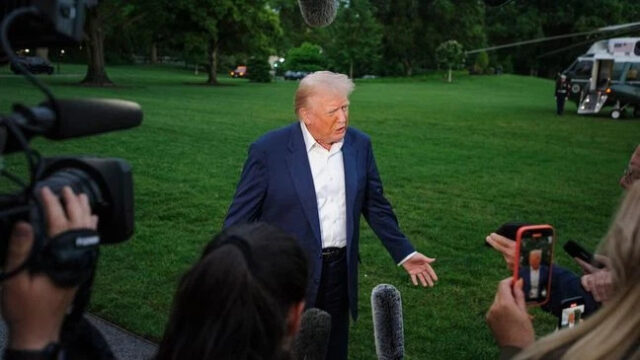
President Donald Trump has announced a sweeping new policy aimed at reviving the U.S. film industry: a 100% tariff on all foreign-produced films entering the United States. The announcement, made during a campaign rally and later confirmed via an official statement, is part of what Trump called a “bold effort to bring Hollywood back home.”
The directive will be enforced by the U.S. Department of Commerce in coordination with the Office of the U.S. Trade Representative. Trump justified the move by citing what he described as an “unfair flood” of foreign incentives that have siphoned American film production overseas. He argued that this exodus has weakened not only the entertainment sector but also national cultural influence and economic resilience.

“Hollywood used to be the envy of the world — now we’re sending half our film budgets to foreign countries. That stops now,” Trump said. “We’re going to bring the magic of the movies back to American soil, with American jobs and American stories.”
Economic Context and Industry Decline
The decision comes amid ongoing struggles within the U.S. film industry. According to industry analysts, Hollywood production has dropped by more than 40% over the past decade, accelerated by pandemic-related shutdowns, prolonged industry strikes, and competition from global markets offering tax breaks and cheaper labor.
In 2023 alone, nearly 50% of U.S. film production budgets were spent abroad — a fact Trump cited as both an economic and national security concern. The new tariff, he said, is meant to level the playing field by making it more financially viable to shoot and produce films domestically.
Industry insiders note that locations such as Canada, the UK, New Zealand, and Eastern Europe have become increasingly attractive to U.S. filmmakers due to generous subsidies, skilled crews, and favorable exchange rates.
Industry Reaction and Global Fallout
The announcement has drawn mixed reactions. Some U.S.-based filmmakers and unions cautiously welcomed the move as a potential stimulus for domestic production jobs, though many expressed concern about its broader implications.
Critics warn that the 100% tariff could spark retaliatory trade measures from foreign governments, potentially damaging the international revenue streams of U.S. studios. Hollywood’s largest blockbusters now often earn more overseas than domestically, and foreign distribution is crucial to most studios’ financial strategies.
“This could backfire severely,” said Dana Welch, a media economist at UCLA. “Hollywood relies heavily on international box office receipts. If countries start banning or taxing American films in response, we could see a net loss instead of a gain.”
Cultural and Political Implications
Trump’s rhetoric framed the issue not only as economic but cultural. He accused foreign governments of manipulating soft power by promoting their own entertainment exports while “undercutting American culture” with favorable trade practices.
Supporters of the policy argue it’s long overdue. “We’ve been watching Hollywood decay from within, outsourcing creativity in the name of profit,” said filmmaker and Trump ally Peter Cavell. “This tariff forces us to invest in our talent here at home.”
However, opponents caution that the policy may stifle artistic collaboration and global storytelling, especially in an era where co-productions and international partnerships are increasingly common.
What Comes Next?
The implementation timeline for the tariff remains unclear, though Trump has called for “immediate action” if re-elected. Legal challenges and international disputes are almost certain, particularly through the World Trade Organization or bilateral trade agreements with major allies like Canada, France, and South Korea — all of which maintain robust film industries and export markets.
While Trump’s proposed tariff is unprecedented in its scale, it reflects a broader trend of economic nationalism that has marked his trade policies, from steel and autos to digital media.
As the U.S. film industry grapples with evolving viewer habits, streaming wars, and post-pandemic restructuring, Trump’s 100% tariff may set the stage for a dramatic clash between economic protectionism and global entertainment diplomacy.



